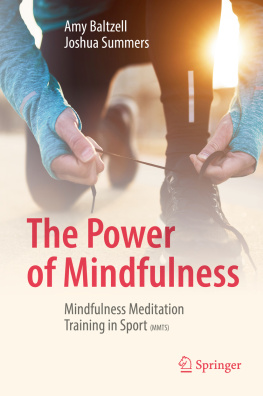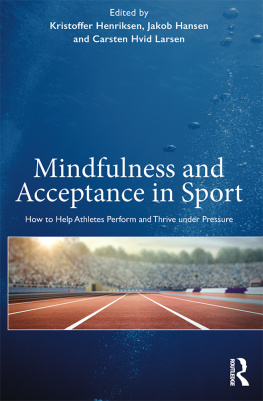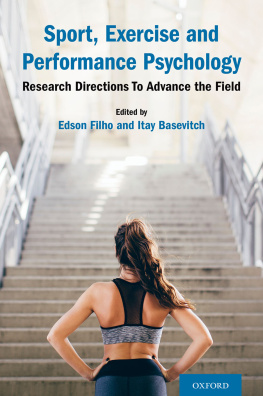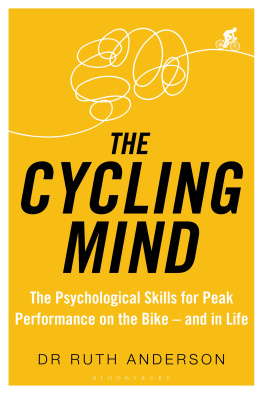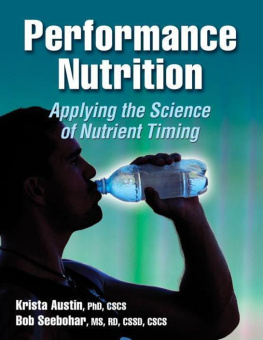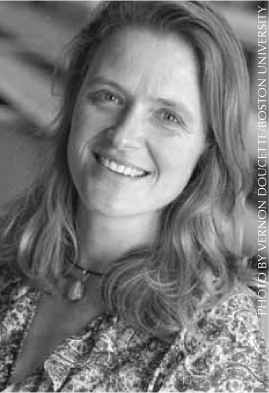About the Author
Amy L. Baltzell
A my L. Baltzell, EdD, directs the sport psychology program and is a professor in the School of Education at Boston University. Her academic credentials include a bachelors degree in economics from Wesleyan University of Connecticut (1987), a masters in counseling (1996) from Boston University, and a doctorate in counseling psychology, specializing in sport psychology, from Boston University in 1999. Her research interests are in the areas of mindfulness, performance enhancement, and values in sport. She has presented a dozen academic papers and dozens of invited talks across the country.
As a licensed psychologist specializing in sport and performance, Baltzell works with professional, elite, collegiate, and high school athletes and professional musicians. She provides educational workshops to teams and organizations, keynote presentations, and coach education training sessions. She also has a private practice in which she provides one-on-one consulting to athletes and performers.
Prior to entering academia, Baltzell was an elite multi-sport athlete. She was a three-year member of the U.S. National Rowing Team, including the 1992 Olympic team and during that time won multiple national and international gold medals. She also was a member of the historic 1995 all-womens Americas Cup sailing team, America. Additionally, she played basketball, lacrosse, field hockey, sailed, and ran the Boston Marathon. She also previously served as an athletic coach, notably as the head womens lightweight rowing coach at Harvard University.
This is Baltzells third book. She is a co-author of Whose Game is it Anyway, Parenting Your Athletic Child and Character and Coaching.
Acknowledgments
A special thank you is owed to Cathy OConnor, who has gone beyond anyone could ever ask for. I am humbled by her generous and brilliant editing and mentorship.
I thank my husband, John McCarthy, for his tireless and kind support of all that I do. I thank my sister and brother, Laura and Mark, for their encouragement and love. Thank you Bronwyn Malicoat, Katie Kilty, and Linda Flaherty for your steady friendships. And I appreciate the support and space that my kidsShayna, Luke, and Zoeygave me through the many early morning sessions and weekends that it took me to write this book. I thank my college coach, Pat Callahan, who believed in me and helped me learn how to get the best out of myself.
Thank you Linda Sargent for believing in me and getting me moving. Thank you to Karen Levy, freelance book editor, who guided me through the many hurdles of the book publishing world. And, of course, thank you to Steven Pope, director of Fitness Information Technology, who believed in this project from the start. I appreciate all of the hard work of Matt Brann, my editor at Fitness Information Technology. And finally, I am grateful to Phil Simms generosity in writing such a powerful, heartfelt foreword.
To my academic world: Thank you to the leadership in Boston Universitys School of Education. A special thank you to Charlie Glenn for the sabbatical to write. Thank you to my past co-authors and collaborators: John Yeager, Richard Ginsburg, and Steve Durant. Thank you, past department chair, Shanley Allan, for your frequent encouragement. Thank you to Karen Bohlins steadfast belief and support in my work. And thanks to Adam Naylor, who has been a wonderful colleague.
I would like to thank all of the athletes, musicians, parents, teachers, and coaches with whom I have worked. Through their stories, they have helped me understand what it takes psychologically to get the best out of ourselves.
References
CHAPTER 2
Aristotle. (1908). Nichomachean ethics. Ross, W. D. (Trans.). Oxford, UK: Clarendon Press.
Bandura, A. (1997). Self-efficacy: The exercise of control. New York: Worth Publishers.
Peterson, C. (2006). A primer in positive psychology. New York: Oxford Press.
Peterson, C., & Seligman, M. (2004). Character strengths and virtues: A handbook and classification. New York: Oxford University Press.
CHAPTER 3
Fredrickson, B. (2001). The role of positive emotions in positive psychology: The broaden-and-build theory of positive emotions. American Psychologist, 56 (3), 218-226.
Fredrickson, B. (2009). Positivity: Groundbreaking research reveals how to embrace the hidden strength of positive emotions, overcome negativity, and thrive. New York: Random House.
CHAPTER 4
Baumeister, R. (2002). Ego depletion and self-control failure: An energy model of the selfs executive function. Self and Identity, 129-136.
Baumeister, R., Bratslavsky, E., Muraven, M., & Tice, D. (1998). Ego depletion: Is the active self a limited resource? Journal of personality and social psychology, 74 (5), 1252-1265.
Danner, D., Snowdon, D., & Friesen, W. (2001). Positive emotions in early life and longevity: Findings from the nun study. Journal of personality and social psychology, 80, 804-813.
Fredrickson, B., & Losada, M. (2005). Positive affect and the complex dynamics of human flourishing. American Psychologist, 60 (7), 680.
Galliot, M., Baumeister, R., DeWall, C., Maner, J., Plant, A., Tice, D., Brewer, L., & Schmeichel, B. (2007). Self-control relies on glucose as a limited energy source: Willpower is more than a metaphor. Journal of personality and social psychology, 92 (2), 325-336.
Orlick, T. (2000). In pursuit of excellence (3rd ed.). Champaign, IL: Human Kinetics.
Rozanski, A., & Kubzansky, L. D. (2005). Psychologic functioning and physical health: A paradigm of flexibility. Psychosomatic Medicine, 67 (1) S47-S53.
Senge, P. (2006). The fifth discipline: The art & practice of the learning organization. New York: Random House.
CHAPTER 5
Baltzell, A. (2000). Psychological factors and coping resources related to elite rowers performance. USOC Final Report: A USOC Science and Technology Grant Project Final Report.
Dweck, C. (2006). Mindset: The new psychology of success. New York: Random House.
CHAPTER 6
Carver, C. S., Scheier, M. F., & Segerstrom, S. C. (in press). Optimism. Clinical Psychology Review.
Emmons R., & Shelton, C. M. (2005). Gratitude and the science of positive psychology. In C. Snyder & S. Lopez (Eds.), Handbook of positive psychology (pp. 459-471). New York: Oxford University Press.
Maslow, A. (1970). Motivation and personality. New York: Harper and Row.
Peterson, C. (2006). A primer in positive psychology. New York: Oxford Press.
Snyder, C., & Lopez, S. (Eds.). (2002). Handbook of positive psychology. New York: Oxford University Press.
CHAPTER 7
Csikszentmihalyi, M. (1991, 2008). Flow. New York: Harper and Row.
Jackson, S. (1992). Athletes in flow: A qualitative investigation of flow states in elite figure skaters. Journal of Applied Sport Psychology, 4, 161-180.
Jackson, S. (1995). Factors influencing the occurrence of flow state in elite athletes. Journal of Applied Sport Psychology, 7, 138-166.
Jackson, S., & Csikszentmihalyi, M. (1999). Flow in sports: The keys to optimal experiences and performances. Champaign, IL: Human Kinetics.
CHAPTER 8
Fredrickson, B., & Losada, M. (2005). Positive affect and the complex dynamics of human flourishing. American Psychologist, 60 (7), 678-686.
Gottman, J. M. (1994). What predicts divorce? The relationship between marital processes and marital outcomes. Hillsdale, NJ: Erlbaum.
Hanton, S., & Jones, G. (1999). The acquisition and development of cognitive skills and strategies: I. Making the butterflies fly in formation. The Sport Psychologist, 13, 1-21.


